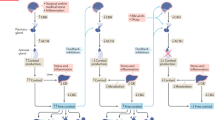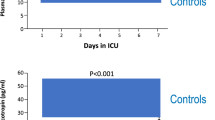Abstract
Purpose
To evaluate the effects of three specific conditions related to critical care on adrenal function with special regard to the levels of serum cortisol, corticotropin (ACTH), dehydroepiandrosterone sulfate, and cytokines.
Methods
The study enrolled a total of 74 children who were divided into three groups. Group 1 comprised 23 patients who had acute critical illness (ACI) associated with severe sepsis/septic shock. Group 2 comprised 27 patients who had ACI without sepsis. Group 3 comprised 24 patients who underwent major surgery. Blood samples were obtained for baseline measurements and a low-dose ACTH stimulation test (LD-ST) was performed. Serial ACTH and cortisol levels were measured with an interval of 3 days and LD-ST was repeated on day 14 for all groups.
Results
Baseline cortisol, ACTH, and dehydroepiandrosterone sulfate levels were significantly higher in patients with adrenal insufficiency (AI) than those of without AI. AI was detected in four patients in group 1, seven in group 2, and ten in group 3. Consecutive cortisol and ACTH levels did not differ significantly among the groups. On day 14, the recovery rate in patients with AI was 82 % in the whole group. Patient’s age and interleukin-10 level were found to be independent predictors of AI.
Conclusions
A considerable proportion of patients in these three groups had AI with a high spontaneous recovery rate in 2 weeks. The presence of sepsis was not associated with an increased risk of AI. Our serial cortisol and ACTH values in these different groups could be used as reference values for further studies.


Similar content being viewed by others
References
Pizarro CF, Troster EJ (2007) Adrenal function in sepsis and septic shock. J Pediatr (Rio J) 83:155–162
Agwu JC, Spoudes H, Hindmarsh PC, Pringle PJ, Brook GC (1999) Tests of adrenal insufficiency. Arch Dis Child 39:194–204
Zarkovic M, Ciric J, Stojanovic M, Penezic Z, Trbojevic B, Drezgic M, Nesovic M (1999) Optimizing the diagnostic criteria for standard (250-microg) and low dose (1-microg) adrenocorticotropin tests in the assessment of adrenal function. J Clin Endocrinol Metab 84:3170–3173
Langer M, Modi BP, Agus M (2006) Adrenal insufficiency in the critical ill neonate and child. Curr Opin Pediatr 18:448–453
Rothwell PM, Udwadia ZF, Lawlwe PG (1991) Cortisol response to corticotropin and survival in septic shock. Lancet 337:582–583
Menon K, Ward RE, Lawson ML, Gaboury I, Hutchison JS, Hebert PC, Canadian Critical Care Trials Group (2010) A prospective multicenter study of adrenal function in critically ill children. Am J Respir Crit Care Med 182:246–251
Pizarro CF, Troster EJ, Damiani D, Carcillo JA (2005) Absolute and relative adrenal insufficiency in children with septic shock. Crit Care Med 33:855–859
Siraux V, De Backer D, Yalavatti G, Melot C, Gervy C, Mockel J (2005) Relative adrenal insufficiency in patients with septic shock: comparison of low-dose and conventional corticotropin tests. Crit Care Med 33:2479–2486
Beishuizen A, Vermes I, Hylkema BS, Hanen C (1999) Relative eosiniphilia and functional adrenal insufficiency in critically ill patients. Lancet 353:1675–1676
Dorin RI, Qualls CR, Crapo LM (2003) Diagnosis of adrenal insufficiency. Ann Intern Med 139:194–204
Tordjman K, Jaffe A, TRostanetsky Y, Greenman Y, Limor R, Stern N (2000) Low-dose (1 mcg) adrenocorticotropin (ACTH) stimulation as a screening test for impaired hypothalamo-pituitary-adrenal axis function: sensitivity, specificity and accuracy in comparison with the high-dose (250mcg) test. Clin Endocrinol 52:633–640
Riordan FA, Thomson AP, Ratcliffe JM, Sills JA, Diver MJ, Hart CA (1999) Admission cortisol and adrenocorticotropic hormone levels in children with meningococcal disease: evidence of adrenal insufficiency? Crit Care Med 27:2257–2261
Hatherill M, Tibby SM, Hilliard T, Turner C, Murdoch IA (1999) Adrenal insufficiency in septic shock. Arch Dis Child 80:51–55
Bone M, Diver M, Selby A, Sharples A, Addison M, Clayton P (2002) Assessment of adrenal function in the initial phase of meningococcal disease. Pediatrics 110:563–569
Casartelli CH, Garcia PC, Branco RG, Piva JP, Einloft PR, Tasker RC (2007) Adrenal response in children with septic shock. Intensive Care Med 33:1609–1613
Menon K, Lawson M (2007) Identification of adrenal insufficiency in pediatric critical illness. Pediatr Crit Care Med 8:276–278
Antonelli M, Azoulay E, Bonten M, Chastre C, Citerio G, Conti G, Backer D, Gerlach H, Hedenstierna G, Joannidis M, Macrae D, Mancebo J, Maggiore MS, Mebazaa A, Preiser JC, Pugin J, Wernerman J, Zhang H (2011) Year in review in intensive care medicine 2010: III. ARDS and ALI, mechanical ventilation, weaning, endotracheal intubation, lung ultrasound and paediatrics. Intensive Care Med 37:394–410
Hebbar K, Rigby MR, Felner EI, Easley KA, Fortenberry JD (2009) Neuroendocrine dysfunction in pediatric critical illness. Pediatr Crit Care Med 10:35–40
Annane D, Sebille V, Troche G, Raphael JC, Gajdos P, Bellissant E (2000) A 3-level prognostic classification in septic shock based on cortisol levels and cortisol response to corticotropin. JAMA 283:1038–1045
Brander L, Haltmeier T, Suter A, Studer P, Inderbitzin D, Candinas D, Vogt A, Henzen C, Takala J, Jacob SM (2009) Peri-operative adrenocortical response to low-dose (1 microg) ACTH and relation to postoperative complications in patients undergoing elective abdominal surgery. Surgery 146:88–99
Dimopoulou I, Tzanela M, Vassiliadi D, Mavrou I, Kopterides P, Orfanos S, Kotanidou A, Kontogiannopoulou S, Vasdekis S, Tsangaris I, Armaganidis A, Macheras A, Ilias I, Kostopanagiotou G, Tsagarakis S (2008) Pituitary-adrenal responses following major abdominal surgery. Hormones (Athens) 7:237–242
Frankel LR, Kache S (2007) Shock. In: Kliegman RM, Behrman RE, Jenson HB, Stanton BF (eds) Nelson textbook of pediatrics, 18th edn. Saunders Elsevier, Philadelphia, pp 413–421
Pollack MM, Patel KM, Ruttimann UE (1996) PRISM III: an updated pediatric risk of mortality score. Crit Care Med 24:743–752
Hebbar K, Rigby MR, Felner EI, Easley KA, Fortenberry JD (2009) Neuroendocrine dysfunction in pediatric critical illness. Pediatr Crit Care Med 10:35–40
Marik PE, Zaloga GP (2003) Adrenal insufficiency during septic shock. Crit Care Med 31:141–145
Rivers EP, Gaspari M, Saad GA, Mlynarek M, Fath J, Horst HM, Wortsman J (2001) Adrenal insufficiency in high risk surgical ICU patients. Chest 119:889–896
Dimopoulou I, Tsagarakis S, Kouyialis AT, Roussou P, Assithianakis G, Christoforaki M, Ilias I, Sakas DE, Thalassinos N, Roussos C (2004) Hypothlamic-pituitary-adrenal axis dysfunction in critically ill patients with traumatic brain injury: incidence, pathophysiology, and relationship to vasopressor dependence and peripheral interleukin-6 levels. Crit Care Med 32:404–408
Menon K, Clarson C (2002) Adrenal function in pediatric critical illness. Pediatr Crit Care Med 3:112–116
Bouachour G, Tirot P, Gouello JP, Mathieu E, Vincent JF, Alquier P (1995) Adrenocortical function during septic shock. Intensive Care Med 21:57–62
Bollaert PE, Fieux F, Charpentier C, Levy B (2003) Baseline cortisol levels, cortisol response to corticotropin, and prognosis in the late septic shock. Shock 19:13–15
Sarthi M, Lodha R, Vivekanandhan S, Arora N (2007) Adrenal status in children with septic shock using low-dose stimulation test. Pediatr Crit Care Med 8:23–28
Arafah BM (2006) Hypothalamic pituitary adrenal function during critical illness: limitations of current assessment methods. J Clin Endocrinol Metab 91:3725–3745
Goodman S, Sprung CL, Ziegler D, Weiss YG (2005) Cortisol changes among patients with septic shock and the relationship to ICU and hospital stay. Intensive Care Med 31:1362–1369
Marik PE, Zaloga GP (2002) Adrenal insufficiency in the critically ill: a new look at an old problem. Chest 122:1784–1796
Arlt W, Hammer F, Scanning P, Butcher SK, Lord JM, Allolio B, Annane D, Stewart PM (2006) Dissociation of serum dehydroepiandrosterone and dehydroepiandrosterone sulfate in septic shock. J Clin Endocrinol Metab 91:2548–2554
Bornstein SR, Chroussos GP (1999) Clinical review 104: adrenocorticotropin (ACTH) and non-ACTH-mediated regulation of the adrenal cortex: neural and immune inputs. J Clin Endocrinol Metab 84:1729–1736
den Brinker M, Joosten KF, Liem O, de Jong FH, Hop WC, Hazelzet JA, van Dijk M, Hokken-Koelega AC (2005) Adrenal insufficiency in meningococcal sepsis: bioavailable cortisol levels and impact of interleukin-6 levels and intubation with etomide on adrenal function and mortality. J Clin Endocrinol Metab 90:5110–5117
Kwon YS, Suh GY, Jeon K, Park SY, Lim SY, Koh WJ, Chung MP, Kim H, Kwon OJ (2010) Serum cytokines and critical illness-related corticosteroid insufficiency. Intensive Care Med 36:1845–1851
Acknowledgments
This study was supported by Karadeniz Technical University Scientific Research Project Unit (no. 2008.114.003.7).
Conflicts of interest
The authors declare that they have no competing interests.
Author information
Authors and Affiliations
Corresponding author
Rights and permissions
About this article
Cite this article
Karagüzel, G., Atay, S., Değer, O. et al. The effects of three specific conditions related to critical care on adrenal function in children. Intensive Care Med 38, 1689–1696 (2012). https://doi.org/10.1007/s00134-012-2662-5
Received:
Accepted:
Published:
Issue Date:
DOI: https://doi.org/10.1007/s00134-012-2662-5




